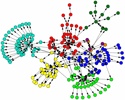 Alan Hirsch’s new book, The Forgotten Ways, ought to be mandatory reading for anyone interested in movement building. I’m still absorbing his thoughts and working to make application in whatever arena I can influence. I left my copy with Dean Carlson of OC International in South Africa. Dean and his team are doing an awesome job of planting church planting movements in South Africa, Zimbabwe, etc. Since books are harder to come by there, I thought I’d leave my annotated copy with Dean. Fortunately, Alan sent me another copy which I’m continuing to study since I got home. (Check out The Next Reformation for a great summary of Alan’s book.)
Alan Hirsch’s new book, The Forgotten Ways, ought to be mandatory reading for anyone interested in movement building. I’m still absorbing his thoughts and working to make application in whatever arena I can influence. I left my copy with Dean Carlson of OC International in South Africa. Dean and his team are doing an awesome job of planting church planting movements in South Africa, Zimbabwe, etc. Since books are harder to come by there, I thought I’d leave my annotated copy with Dean. Fortunately, Alan sent me another copy which I’m continuing to study since I got home. (Check out The Next Reformation for a great summary of Alan’s book.)
Last week, I posed the following questions–derived from Alan’s chapters on Organic Systems—to church leaders at the Flagship Conference for the Military Missions Network. I thought I’d pass them on to you.
Use the Principles of Network Theory and Living Systems Theory as a different set of lenses to evaluate the “spiritual movement” on your campus or location. What is true or not true of your movement? What are the implications? How do you lead an “organic, networked” spiritual movement?
Principles of Network Theory
- No obvious center
- Each new member adds value
- Everyone wants to contribute
- Knowledge occurs at the edge
- Values are the organization (DNA)
- Power Law–some nodes become hubs
- Six Degrees of Separation–we are all connected by only six degrees of separation
- Power of Weak Links–there is power in loose connections (i.e. I am more likely to find a job thru a network of acquaintances than thru a network of close friends. Why? a loose network of acquaintances has more personal connections than a network of close friends who all have the same set of friends.)

Principles of Living Systems Theory
- Innate intelligence exists everywhere; intelligence is distributed
- Life is profoundly interconnected
- Systems are constantly interacting with its environment
- Equilibrium with their environment is unhealthy
- Adaptive…as living systems interact with their environment, they adapt
- Living systems are dependent upon information
- New forms emerge as living systems interact and adapt

Leave a Reply